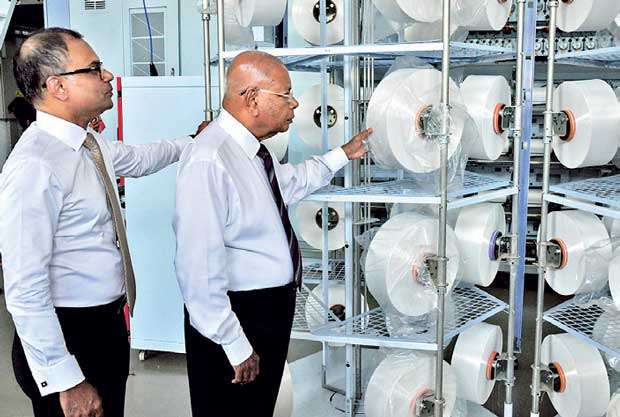18 Jul 2018 - {{hitsCtrl.values.hits}}

BPPL Holdings Ltd Chairman Sarath Dayantha Amarasinghe (right) and Managing Director/Chief Executive Officer Dr. Anush Amarasinghe inspect some of the polyester yarn rolls at the newly commissioned factory
By Nishel Fernando
Eco Spindles, a wholly owned subsidiary of BPPL Holdings Ltd (BPPL) yesterday inaugurated Sri Lanka’s first ever polyester yarn plant at Horana Export Processing Zone with a Rs.800 million investment.
The facility will manufacture polyester yarn from recycled Polyethylene Terephthalate (PET) bottle flakes.
Addressing the inauguration event BPPL CEO/Managing Director, Dr. Anush Amarasinghe said the state-of-the-art plant will bring Sri Lanka’s apparel industry one step closer to the backward integration process, while noting that the global apparel industry is increasingly moving from supplying cotton-based apparels to polyester, as it’s more versatile and less expensive.
“Most of the fabric plants are utilising cotton, but the growth is in polyester yarn,” he said. He also highlighted that this plant is one of two plants in the world that create yarn directly from flakes circumventing the polymerization where flakes are first converted to chips and then to yarn.
“The factory’s state-of-the-art spinning and texturing machinery from Europe will make it a game-changer for the industry,” he stressed.
Speaking to Mirror Business, Dr. Amarasinghe revealed that BPPL is planning to invest around Rs.1-1.5 billion in another state-of-the-art yarn production plant at the same premises expanding production to meet local as well as to meet export demand. Meanwhile, BPPL expects to double the used PET bottle collection to 400 tonnes per month within the next 12 months. According to Dr. Amarasinghe, BPPL collects nearly 200-250 tonnes of PET waste amounting to approximately 20 percent virgin PET imports into Sri Lanka.
He noted that 70 tonnes of recycled PET waste will be utilised for manufacturing synthetic yarn while around 150 tonnes of PET waste for the production of synthetic brush filaments. Dr. Amarasinghe said the newly launched polyester yarn production plant can produce 15 percent of the polyester yarn demanded by the local apparel industry. However, with the yarn plant in the pipeline, he said BPPL will significantly increase yarn production for the local apparel sector in future.
“By sourcing polyester yarn from Sri Lanka, fabric manufacturers can significantly reduce lead times and also lower inventory costs,” he said. According to BPPL, the polyester yarn of 10 recycled PET bottles is sufficient to make a t-shirt. The BPPL has targeted the fabric mills of industry leaders such as MAS, Hirdaramani, Brandix as well as Hayleys while it is also looking at exporting to countries such as Taiwan.
The polyester yarn plant is also equipped to produce recycled yarn, which is considered a niche segment with a good growth potential.
“Depending on the customer requirement, this plant can produce either virgin or recycled yarn,” Dr. Amarasinghe said.
In addition, BPPL also had earlier invested in a Rs.200 million bottle-washing plant at the same premises and it has also installed a water treatment plant where used water is treated and re-used with only 5 percent of water being discharged. According to the latest BPPL annual report, it had secured a term loan to the value of Rs.536.34 million from HSBC and another to the tune of Rs 40.65 million from HNB for the yarn plant and machinery.
The BPPL hopes the diversification of its business lines into synthetic filament extrusion for other brush manufacturing and polyester yarn production for fabric mills for both local and export markets would become dominant contributors to group’s financials over the medium term.
17 Nov 2024 17 Nov 2024
17 Nov 2024 17 Nov 2024
17 Nov 2024 17 Nov 2024
17 Nov 2024 17 Nov 2024
17 Nov 2024 17 Nov 2024